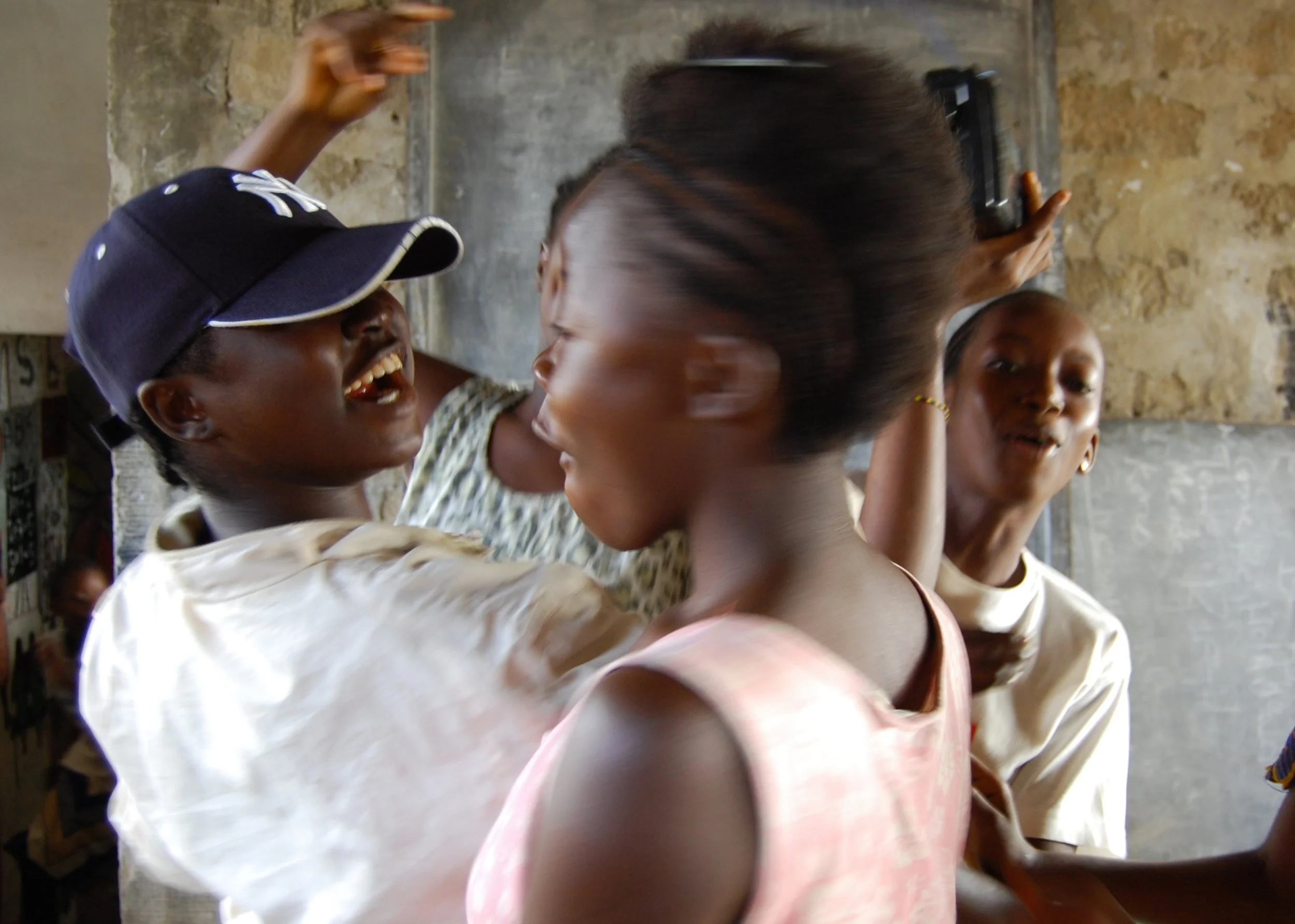i don’t vote*
*but you should.
B.H. holds up his voter ID card on election day in Freetown
B.H. is holding his voter ID card and showing off an index finger stained with purple ink — proof that he’s just voted. It’s election day in Sierra Leone — the country’s first since the end of a brutal, decade-long civil war. Like most of my students, B.H. grew up during that war. Some of his classmates saw family members hacked apart with machetes. Other friends had been child soldiers, forced to commit these horrific atrocities. His generation bears the deep scars of this trauma: they lost childhoods, loved ones, the freedom to choose their own future.
I could tell it would be tricky to talk politics with my students. They were used to feeling voiceless in the political process. So instead of debating, I had them read and translate Shakespeare’s Julius Caesar into Krio. We used the play as a lens for discussing what makes a good leader, whether and how power can be held in check, the warning signs of tyranny. In the months that followed, my students performed scenes from their Krio translation on national radio, and we mounted a full stage production for a community audience. Through the stage, my students began to articulate what they wanted from their next president.
*
I didn’t vote for Hillary. I didn’t vote for Obama. (Before you ready your pitchforks, I promise I didn’t vote for that Tang-colored toad either.) I didn’t vote because I can’t, which makes it all the more frustrating when people squander this right out of disenchantment or laziness.
For most of my adult life, I haven’t been able to vote in the country I call home. Although I feel as American as apple pie, I was born and raised in the Great White North — the land of hockey and legalized pot, of vast expanses of wild country and a mosaic (if an imperfect one) of First Nations and immigrant cultures.
I’m a proud Canadian, but I actually can’t vote there either. In 2015, the conservative government blocked Canadians from voting if they had lived abroad for more than five years. It was a shrewd political strategy aimed at disenfranchising Canada’s 2.8 million expats — a group of voters that tends to skew liberal. Years later, the Supreme Court of Canada has yet to reach a decision on expat voting rights.
At the time, I did what I could to advocate for the party and policies I supported. I signed on as a content strategist and web designer for a Liberal candidate who was facing a tough race in Ontario, I published interviews and articles about Canadian politics, but none of this could substitute for actually casting a vote.
I get it. Voting can feel futile. An epistemologist friend of mine was recently making the case that there’s no point in voting because
Your single vote is not going to tip the scale.
It’s highly unlikely that the person you’re trying to vote into office will actually enact the policies you want.
He’s wrong on both counts. On a national level, a single vote may not decide the result, but plenty of local elections are won and lost by tiny margins. The more people think these elections and their individual ballots don’t matter, the more those missing votes add up.
“If you give up your right to choose who represents you, you leave yourself vulnerable to people who don’t share your priorities. ”
I saw this when I was working on Liz Riley’s campaign in 2015. Each day, she and her team of volunteers would knock on doors in her district and talk to constituents. She was running for office in a staunchly conservative district, but we saw that actually listening to people and building connections with them brought a lot of voters to her side. In addition to her thoughtful policy proposals, they were able to experience what I know on a personal level: That she’s a brilliant, dedicated public servant with insightful views on the issues they care about.
Her opponent ultimately won by 2096 votes. In our post-mortem, I was surprised at how much it all came down to running out of time. As hard as Liz and her volunteers worked, there were 2096 doors they hadn’t reached. If they had had the time and resources to talk to those voters, the scale might well have tipped.
At the state and local levels, your vote is crucial — especially right now. If you live in Colorado, Maine, New Hampshire, or New York, there’s a good chance you could help flip your state legislature.
State legislative races can seem like the unsexiest variety of election, but they’re hugely important. Not only do these bodies make a lot of decisions that affect our daily lives — on healthcare access, transportation, education — they’re also incubators for policies that can resonate across state boundaries and may even be adopted on national level (like Obamacare).
Most importantly, after the census in 2020, state legislatures will be in charge of redistricting. This means they’ll be redrawing district lines and will have the opportunity to curb rampant gerrymandering (the strategy that has allowed parties to split up communities, dilute minority votes, and cherry-pick their own voters).
To my friend’s second point, voting may not be a guarantee that you’ll get every policy you want, but the past two years have made a pretty good case for why voting can still benefit you as an individual. Voting is important because not voting gives power to people who may actively work against your interests. There are plenty of ways that the midterm elections can affect your personal interest, but you may not be aware of these effects until something catastrophic happens: You lose your job, you’re injured in an accident. If you give up your right to choose who represents you, you’re leaving yourself vulnerable to people who don’t share your priorities for yourself or your community.
A mother and child on election day in Lumley, Freetown
There’s a broader case to be made for voting, too, if you consider the many other people who may be vulnerable to the effects of these policies. When Aristotle wrote “Man is a political animal,” he meant that by logic, the good of society should take priority over the good of the individual, because it’s only within the context of society that the individual thrives (the same way a hand or foot is useless when severed from the body). Even if you can’t see how one politician’s decisions might affect you personally, you can be sure they will affect others around you — and that in turn will affect you.
On that quiet, misty morning in Freetown ten years ago, as B.H. and I walked to the polling station, it was as if the whole city was holding its breath, bracing for violence. People kept their heads down, lined up quietly, and cast their votes, but I will never forget B.H.’s smile the moment he emerged — giddy, resplendent, and proud.
Students of EducAid Sierra Leone dancing



